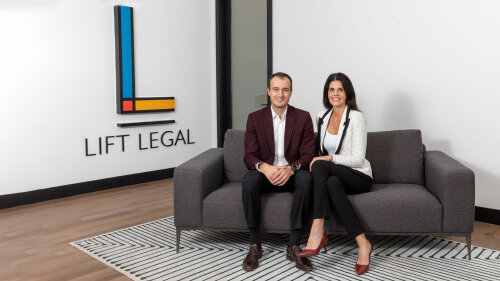Best Same Sex & LGBT Lawyers in St. Albert
Share your needs with us, get contacted by law firms.
Free. Takes 2 min.
Free Guide to Hiring a Family Lawyer
List of the best lawyers in St. Albert, Canada
About Same Sex & LGBT Law in St. Albert, Canada
St. Albert, as part of Alberta and Canada, is governed by federal and provincial laws that protect the rights of members of the LGBTQ+ community. Over recent years, significant progress has been made in advancing equality and legal protection for lesbian, gay, bisexual, transgender, and queer individuals. Same-sex marriage and adoption are legal across Canada, including St. Albert. Anti-discrimination laws also help to ensure equal treatment in the workplace, housing, healthcare, and public services.
Why You May Need a Lawyer
Some situations where legal advice or representation may be needed by members of the LGBTQ+ community in St. Albert include:
- Experiencing discrimination or harassment at work, in housing, or in public services because of sexual orientation or gender identity.
- Navigating family law matters such as divorce, child custody, or adoption as a same-sex couple or LGBTQ+ individual.
- Legal name and gender marker changes on government identification.
- Ensuring proper estate planning, wills, and inheritance are set up to recognize same-sex or non-traditional family structures.
- Dealing with hate crimes or seeking protection orders in cases of threats or violence.
- Assistance with immigration matters, especially for LGBTQ+ refugees or newcomers seeking safety and recognition in Canada.
- Educating or representing students in cases of bullying, discrimination, or issues related to gender expression in schools.
Local Laws Overview
St. Albert is subject to both federal and provincial human rights laws. Key legal protections include:
- Canadian Charter of Rights and Freedoms: Provides fundamental rights and freedoms, including equality rights without discrimination based on sexual orientation or gender identity.
- Canadian Human Rights Act: Federal law prohibits discrimination on various grounds, including sexual orientation, gender identity, and expression.
- Alberta Human Rights Act: Prohibits discrimination and harassment in employment, housing, and public services based on sexual orientation, gender identity, and gender expression.
- Marriage and Family Law: Same-sex marriage is legal; both partners in a same-sex relationship have equal rights concerning divorce, adoption, and parenting.
- Legal Documents: Alberta allows for legal name and gender marker changes on birth certificates and other official documents.
- Anti-Bullying Policies: Schools are required to have policies supporting LGBTQ+ students and allow the formation of supportive groups like Gay-Straight Alliances.
Frequently Asked Questions
Is same-sex marriage legal in St. Albert, Alberta?
Yes, same-sex marriage has been legal throughout Canada since 2005, and all rights and responsibilities apply equally to same-sex and opposite-sex couples in St. Albert.
Can same-sex couples adopt children in Alberta?
Yes, same-sex couples have the same legal rights to adopt children as opposite-sex couples in Alberta.
What legal protections exist against discrimination for LGBTQ+ individuals?
Both federal and provincial laws explicitly protect against discrimination or harassment based on sexual orientation, gender identity, or gender expression in areas such as employment, housing, and public services.
How can someone legally change their name and gender marker in Alberta?
Individuals can apply to change their name and gender marker on legal identification through Alberta Vital Statistics and other relevant government agencies. Documentation and specific forms are required.
Are there laws to protect LGBTQ+ students in schools?
Yes, Alberta law requires public schools to support LGBTQ+ students, enforce anti-bullying policies, and allow student-led organizations like Gender and Sexuality Alliances.
What should I do if I experience discrimination or harassment?
You can file a complaint with the Alberta Human Rights Commission or consult a lawyer for assistance with your specific situation.
Are same-sex relationships recognized for immigration and sponsorship purposes?
Yes, Immigration, Refugees and Citizenship Canada recognizes same-sex relationships for spousal sponsorship, refugee applications, and other immigration matters.
Can sexual orientation or gender identity be grounds for refugee protection in Canada?
Yes, people facing persecution due to sexual orientation or gender identity may apply for refugee status in Canada.
Do transgender individuals have access to transition-related healthcare in Alberta?
Alberta provides some publicly funded transition-related medical services, but coverage and access may vary. Legal support may help navigate health system barriers.
What should LGBTQ+ individuals consider for estate planning?
It is important to create clear, legally valid wills and powers of attorney to ensure your partner and chosen family members are recognized and protected in accordance with your wishes.
Additional Resources
If you need support, information, or legal assistance, consider the following resources and organizations:
- Alberta Human Rights Commission: Investigates and helps resolve complaints of discrimination.
- Pride Centre of Edmonton: Offers resources and support to LGBTQ+ individuals in the Edmonton region, including St. Albert.
- St. Albert Family Resource Centre: Provides family and legal resources to the community, including LGBTQ+ individuals and families.
- Legal Aid Alberta: Offers legal support and guidance for those who meet eligibility criteria.
- Egale Canada: National LGBTQI2S advocacy organization with legal information and hotlines.
Next Steps
If you believe you need legal help regarding a same-sex or LGBTQ+ matter in St. Albert:
- Consider documenting your issue and gathering all related information and paperwork.
- Contact a lawyer or legal clinic experienced in LGBTQ+ law for an initial consultation.
- Reach out to local organizations or support centres for referrals to LGBTQ+-friendly legal services.
- If facing immediate discrimination or harassment, you can file a complaint with the Alberta Human Rights Commission or reach out to Legal Aid Alberta for assistance.
- Stay informed of your rights and speak up-there are protections in place, and help is available to ensure you or your loved ones are treated fairly under the law.
Lawzana helps you find the best lawyers and law firms in St. Albert through a curated and pre-screened list of qualified legal professionals. Our platform offers rankings and detailed profiles of attorneys and law firms, allowing you to compare based on practice areas, including Same Sex & LGBT, experience, and client feedback.
Each profile includes a description of the firm's areas of practice, client reviews, team members and partners, year of establishment, spoken languages, office locations, contact information, social media presence, and any published articles or resources. Most firms on our platform speak English and are experienced in both local and international legal matters.
Get a quote from top-rated law firms in St. Albert, Canada — quickly, securely, and without unnecessary hassle.
Disclaimer:
The information provided on this page is for general informational purposes only and does not constitute legal advice. While we strive to ensure the accuracy and relevance of the content, legal information may change over time, and interpretations of the law can vary. You should always consult with a qualified legal professional for advice specific to your situation.
We disclaim all liability for actions taken or not taken based on the content of this page. If you believe any information is incorrect or outdated, please contact us, and we will review and update it where appropriate.









